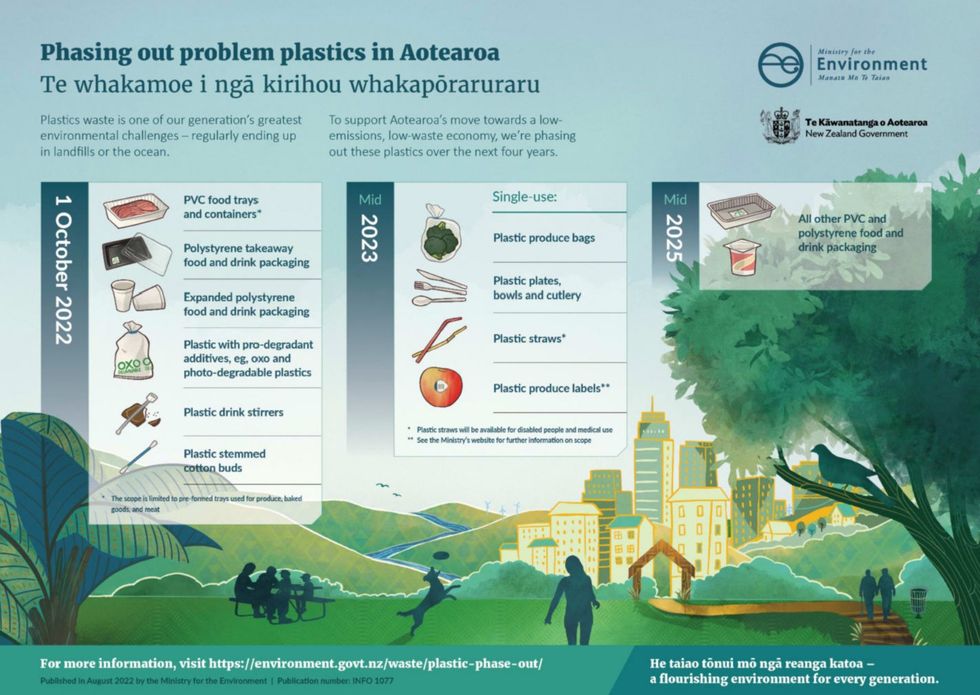In what it says is the first such prohibition in the world, New Zealand's left-of-center government is on the eve of banning an array of single-use plastic products including produce bags beginning Saturday.
The Aotearoa New Zealand Ministry for the Environment this week reminded the nation of 5 million people that starting July 1, single-use plastic bags—"the ones you put your fruit and vegetables in at the supermarket"—will be banned. So will single-use plastic straws, with exceptions for people with disabilities and special health needs, as well as single-use plastic tableware, cutlery, and product labels.
"New Zealanders produce about 60 kilograms of plastic waste per person per year, so this is one of the many steps we are doing to reduce it," Associate Environment Minister Rachel Brooking told reporters Wednesday. "We really want to reduce single-use anything packaging. So we want people to be bringing their own bags, and supermarkets are selling reusable produce bags."
While other countries have banned one or more of the items on New Zealand's new blacklist, the archipelago nation says it's the first to enact such a comprehensive ban.
"Say goodbye to plastic produce bags! We're proud to be the first country in the world to ban single-use plastic produce bags, as well as targeting single-use plastic straws, tableware, and plastic stickers on fruit," the New Zealand Labour Party tweeted Thursday.
"It's the latest phase of our plan to cut plastic pollution, and will prevent the use of 150 million plastic produce bags a year," the party continued. "Already, our 2019 ban on single-use plastic supermarket bags has stopped a billion bags getting into landfills, oceans, and other places."
New Zealand previously banned plastic supermarket bags in 2019 and some polystyrene takeout food and drink packaging in 2022. The country plans to phase out food and beverage packaging made primarily from PVC or rigid polystyrene by mid-2025.
 (Image: Aotearoa New Zealand Ministry for the Environment)
(Image: Aotearoa New Zealand Ministry for the Environment)
"Kiwis have adapted well to bringing in their shopping bags to store and we're confident we can all do the same with bringing our own reusable produce bags from home too," Debra Goulding, the sustainable packaging manager at Foodstuffs—a cooperative of three New Zealand supermarket chains—toldScoop.
"Our teams have been working hard behind the scenes to make the transition easier for Kiwis," Goulding added. "We've focused on getting the right systems in place, having our people trained, and providing in-store signage for customers."
Hannah Blumhardt, a waste researcher and senior associate at the Institute of Governance and Policy Studies at Victoria University in the capital Wellington, toldThe Detail podcast that policymakers should focus on banning many more single-use items.
"We might replace single-use plastic plates with a single-use paper plate, but that paper plate has still required resources to be made, still requires energy to make that paper plate, and then the paper plate is probably going to be food contaminated so it's not going to be recyclable—it often won't be compostable either," she said.
"You've got countries like France—at the beginning of this year they've said that if you're a hospitality outlet and you're serving customers to have here, it is mandatory to use reusable plates and cups and cutlery—so you end up reducing all disposable items," Blumhardt continued.
"In Germany," she added, "they've also passed a law that's come into effect this year where any hospitality outlet that does takeaway, and that includes delivery services, they have to offer a reusable takeaway container option alongside the single-use option and it's got to be the same price or cheaper than the single-use option."
New Zealand's expanded plastics prohibition follows the second round of international negotiations on a global plastics treaty—an accord opposed by fossil fuel and other corporate interests.


 (Image: Aotearoa New Zealand Ministry for the Environment)
(Image: Aotearoa New Zealand Ministry for the Environment)